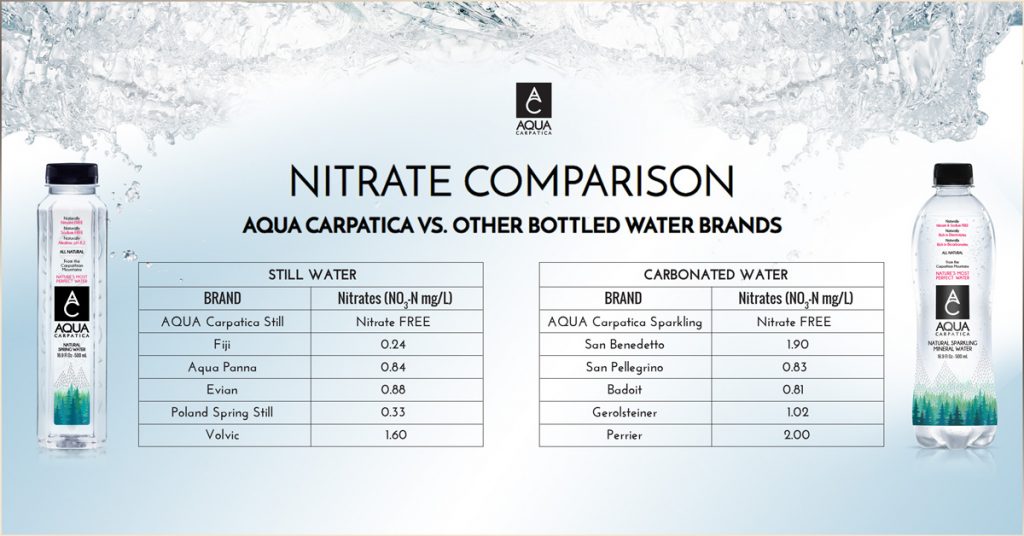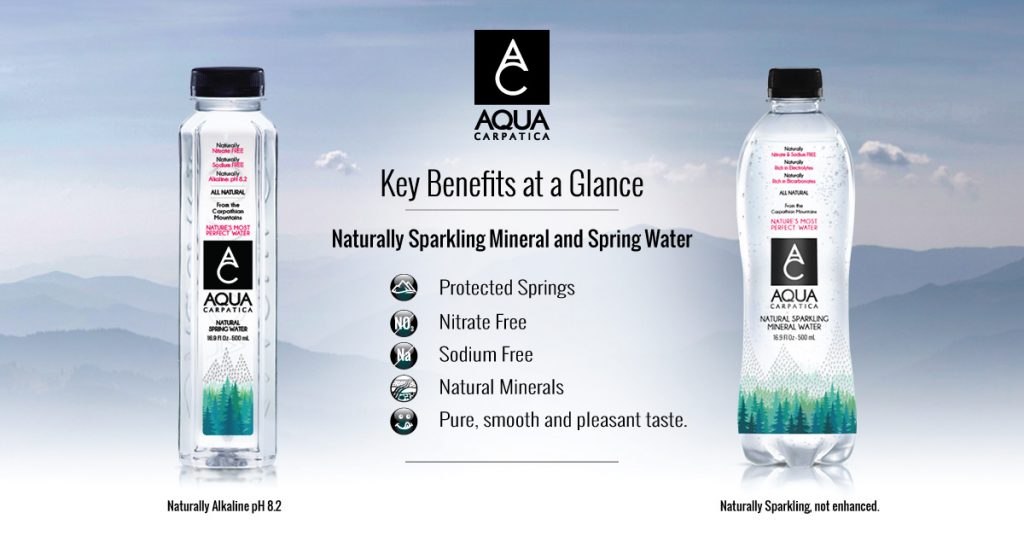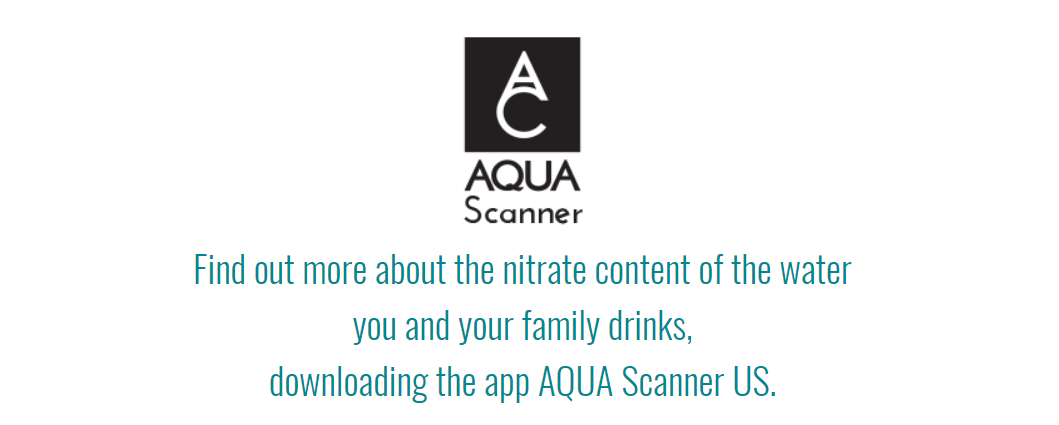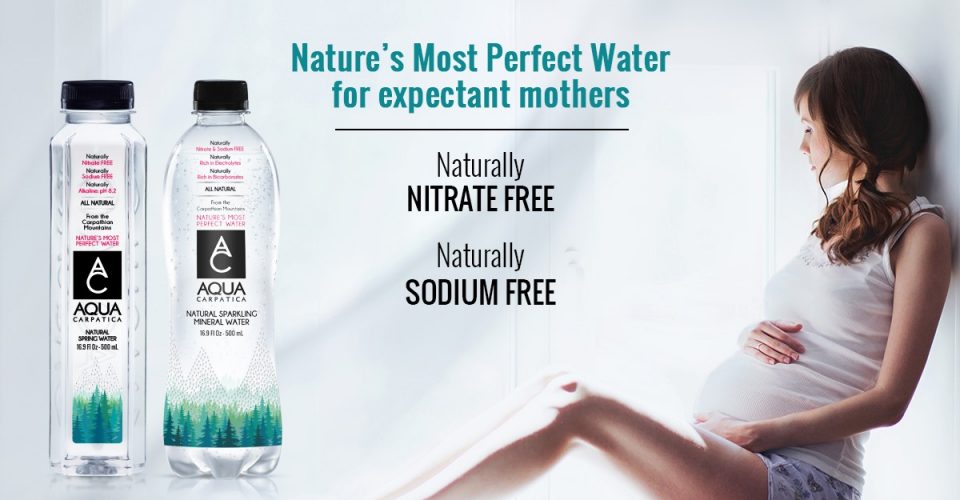Hydration is essential at every stage in life. During pregnancy it is even more important since water is a key element in the development of the fetus. Proper hydration is especially essential during pregnancy when women’s bodies undergo major changes in order to help meet the physiological changes that the pregnant woman is facing.
During this special bodily state, water consumption is different and the quantity of water consumed needs to increase. Moreover, even the slightest dehydration will increase the tiredness that all pregnant women experience to various degrees.
Water plays a significant role in conveying nutrients to the fetus, allowing it to develop. It all starts with the water that facilitates the absorption of essential elements by the cells and carries the vitamins, minerals and hormones in the blood cells. These enriched cells reach the placenta and then the baby. Moreover, water is needed to support the increase in blood plasma volume and to produce breast milk.
Water also helps eliminate toxins, because it contributes to breaking down toxins and carrying them away in the urine via the kidneys. When we consume sufficient water, the risk of urinary infections is reduced and we also help the digestion process and avoid constipation, which around 32 per cent of pregnant women are affected by.
The Health and Human Services Department (HHS) has stated in their 2015-2020 Dietary Guidelines for Americans (DGA), the importance of water consumption for a healthy diet. The guidelines provide strong support for the role played by water in American’s diets. Ultimately, drinking more water is one of the easiest ways to follow the new nutrition advice from America’s top scientists.
Water is an essential nutrient for pregnant and breastfeeding women likewise. Experts suggest that women breastfeeding make sure they are drinking an extra 700 ml of water daily during breastfeeding over those 2000ml/ day of total water intake recommended by the European Federation of Bottled Waters.
What kind of water is best for you?
Therefore, water consumption is vital during pregnancy, and provides a healthy environment for both baby and mother. It is important that the mother and later the child drink water that is pure – low in sodium and with no toxins or traces of fertilizers.
Besides sodium, calcium, magnesium and other salts, bottled water may also contain an ingredient you won’t find mentioned on the label: nitrates. Nitrates are fertilizers. Nitrates are good for plants, but not for humans and in large quantities nitrates are harmful to humans and particularly hazardous for babies.
They can be found in nature and they are used in agriculture. Massive agricultural use of nitrates pollutes aquifers, meaning they end up in bottled water. They are tasteless, colorless and odorless. And you’re not likely to find any mention of them on the label.

NITRATES are heavy oxidants. They are undesirable substances, harmful to human health.
Babies are most vulnerable to nitrate contamination because their micro-bacterial flora has not yet developed to fight them. Once ingested, nitrates are converted into nitrites – much more toxic than nitrates. The ingestion of a large quantity can cause gastric problems, infectious diarrhea, hives and rashes, and even blue baby syndrome.
Blue baby syndrome, known medically as methemoglobinemia, is the most dangerous disorder that nitrate contamination can cause in infants. It starts with breathing problems, caused by an insufficient supply of oxygen to the blood, and quickly leads to asphyxiation and death. This is why it is so important to prepare baby food using water that has the lowest possible nitrate content.
In many European countries such as France, Germany, Austria, Poland and Italy, the legislation demands that the nitrate content in water for infants should not exceed 2.27 mg of NO3-N per liter, while the limit for adults is 11.3 mg per liter.
There are no regulations on nitrates for infants in the U.S.
The Maximum Contaminant Level for Nitrates is 10 mg of nitrate-nitrogen (NO3-N) per liter for all types of water. According to Environmental Working Group, nitrate levels should not exceed 5 ppm, based on evidence that nitrate can cause problems during pregnancy and could also increase risks of cancer. A study conducted by the National Cancer Institute, indicate that women consuming nitrate-contaminated water face a greater risk of thyroid cancer. Moreover, another study at the University of Iowa discovered a link between long-term nitrate exposures from drinking water and increased risks of ovarian and bladder cancer in women. Based on other findings, there is also an association between nitrate intake and subclinical hypothyroidism in women.
Ingestion of nitrate-contaminated water, in the range of 5 to 10 ml/L increases the risk of colon, ovarian and bladder cancer, as shown by the National Cancer Institute.
Some studies say that babies under the age of 6 months can become seriously ill if exposed to nitrate levels of more than 2.27 mg per liter.
There is also a proven correlation between birth defects and high nitrate levels in the expecting mother. Researchers at Texas University have published a study that examined the relation between prenatal exposure to drinking-water nitrates and various birth defects and which found that higher water nitrate intake was associated with several birth defects in new-born infants. Their conclusion was that expecting and breastfeeding women should avoid drinking water with Nitrate levels higher than 2.27 mg of NO3-N per liter.
NITRATES can provoke:
◦Blue baby syndrome (MD P.G. Sattelmacher. Federal Health Agency, Germany – Methemoglobinemia caused by nitrates in drinking water.)
◦Risk of Neural Tube Defects (Lisa A. Croen, Karen Todoroff, and Gary M. Shaw – Maternal Exposure to Nitrate from Drinking Water and Diet and Risk for Neural Tube Defects and Jean D. Brender, Peter J. Weyer – Prenatal Nitrate Intake from Drinking Water and Selected Birth Defects in Offspring of Participants in the National Birth Defects Prevention Study)
◦Oral Cleft Defects and limb deficiencies (Jean D. Brender, Peter J. Weyer – Prenatal Nitrate Intake from Drinking Water and Selected Birth Defects in Offspring of Participants in the National Birth Defects Prevention Study)
Sparkling Water
Drinking sparkling mineral water during pregnancy is also beneficial. But there are natural sparkling water and artificially carbonated water.
Usually, natural sparkling water is very rich in calcium and magnesium and the natural bicarbonates will help digestion and ease acidity expecting mothers struggle during pregnancy. The amount of calcium and magnesium should be increased during pregnancy and drinking a natural sparkling mineral water can help with that.
Calcium is the mineral element most present in the body and is involved in multiple essential metabolic processes. Doctors’ recommendation for adults is to assure a daily calcium amount between 800 and 1200 mg, both from food (dairy products, soy, tofu, hazelnut, walnuts, broccoli, sardines, salmon) and from natural sparkling water. The persons with hypocalcaemia (like expecting mothers) should increase the dose up to maximum 1500 mg of calcium per day.
AQUA Carpatica Natural Mineral Sparkling Water has a high content of calcium: 24% of the adult’s daily needs per Liter. AQUA Carpatica Natural Spring Water has a content of calcium of 52 mg/l, just enough to add to your daily calcium intake if you have about 2 liters of water daily.
Also Magnesium is an important mineral element for the health of the body. It helps maintain both physical and psychological wellbeing because it plays an important role in the metabolic processes. The lack of magnesium causes hyperemotivity, headaches, trembling, dizziness, insomnia, spasms and numbness of extremities – popularly known as “cramps” – bone pains, allergies and decrease of immunity and the general well-being, The doctors’ recommendation for adults is to assure a daily amount of magnesium between 300 and 320 mg, both from food (cabbage, beet, plums, pumpkin seeds, bananas) and from the natural sparkling water. People who have a magnesium deficiency deficit are recommended to increase the dose up to maximum 350 mg of magnesium per day.
AQUA Carpatica Natural Sparkling Mineral Water gives you 16% of an adult’s daily needs per Liter of Magnesium. AQUA Carpatica Spring Water is also a good source of Magnesium, having a content of 17 mg/L.
Key Benefits at a Glance for the Perfect Water
- Natural Water, not processed or purified
- Coming from a verified, unique source
- Naturally Nitrate Free – ideal for newborns, young children and expectant mothers
- Naturally Sodium Free- recommended for those with high blood sugar or low sodium diets
- Natural Electrolytes
- Clean and smooth taste
- Naturally Alkaline

Hydration should not be overlooked during and after pregnancy since it can help replenish lost fluids and offers numerous health benefits for both mother and later the child. In this regard, it’s highly important that women who are pregnant or trying to get pregnant avoid drinking nitrate-contaminated water.










